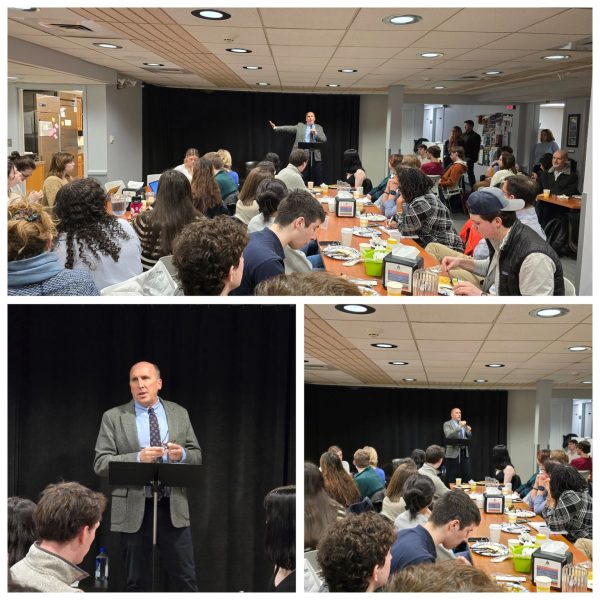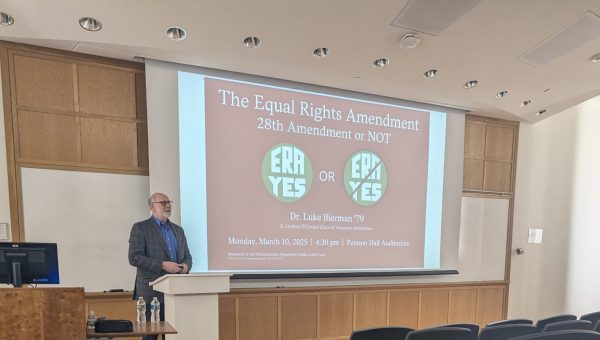Tensions Between Russia and the West
On Monday, October 17, Dr. Mark Galeotti delivered a lecture titled “Putin’s War with the West: Real? A Threat? A Real Threat?” to Colgate faculty, students and staff in Persson Auditorium. Galeotti is a Senior Research Fellow at the Institute of International Relations in Prague and serves as the Director of Mayak Intelligence Consulting. Through his presentation, Galeotti addressed the issues and conflicts between countries in the Western world and Vladimir Putin, the President of Russia.
Galeotti began the lecture by explaining that the war with Putin is not a typical conflict, but rather a war waged through an aggressive series of propaganda, hacking and destabilization. Both the West and Putin blame each other for starting the war. Galeiotti stated that it is the Russians, however, who acted as the impetus for the uncomfortable tension and conflicts between Russia and the West.
“The Russians are wrong,” he said. “They are the ones that are actually trying to destabilize the West.”
Galeotti credited these conflicts to a “clash of aspirations” between Putin and Western leaders, which was heightened by Putin’s recently intensified “packing” of the Russian government with politicians and personnel that share his views, isolating him from different ideas. Galeotti spoke to Putin’s ideological isolation from the West.“He has a little playground, now let him play,” Galeotti said.
Galeotti addressed the fact that Putin sees the conflict as a “struggle between civilizations.” This tension is exacerbated by Russia’s awareness of its limited capabilities compared to the west. In his presentation, Galeotti stated that, since the North Atlantic Treaty Organization (NATO) forces are significantly more powerful than Russia’s military, this “war” will not lead to a military confrontation. He proposed that Russia is aware of the West’s ability to shatter Russia’s financial system. With these restrictions, Galeotti said, Putin must be careful.
Galeotti said that, instead of creating conflict organically, Putin takes advantage of the West’s problems and exacerbates them, ultimately creating as much disruption as possible. Galeotti shared what he believes Putin’s aims are in engaging in a conflict with the West. “He wants us to leave him be,” Galeotti said “The possible solution to Putin’s antagonistic policies could simply be to cut him a deal.”
Furthermore, Galeotti claimed that if Putin were offered a deal where he was guaranteed a sphere of influence, Russia would leave the rest of the world alone. Conflicting definitions of sovereignty, however, don’t allow for this deal to occur.
After his presentation, Galeotti took several questions from attendees. The first question posed addressed Putin’s purported relationship with presidential candidate Donald Trump. Galeotti used this as an example for Russia’s meddling and exacerbation of the west’s problems. He argued that the Russians have always thought that Hillary Clinton will win the upcoming election, and that Donald Trump has only interfered in order to make her as weak as possible once she is elected. His answer aligned with his argument that Russia is taking advantage of its few opportunities to weaken the West.
Senior Teddy O’Hara shared his thoughts on the talk.
“I would say that this lecture illuminated the nuisance that is Putin and the way in which he uses Russia not as an inherent threat to the U.S., but something worth our constant attention and mediation,” O’Hara said. “The clash of world views and differing concepts of sovereignty pit the West and Russia against each other, as the latter, according to Galeotti, exploits and magnifies a variety of issues that the West sees as unacceptable. I found Galeotti’s argument to be refreshingly accurate in dumbing down Putin’s policies and actions, asserting that, by keeping him at bay, the U.S. can effectively counteract his regime without complet[ely] upending it.”






